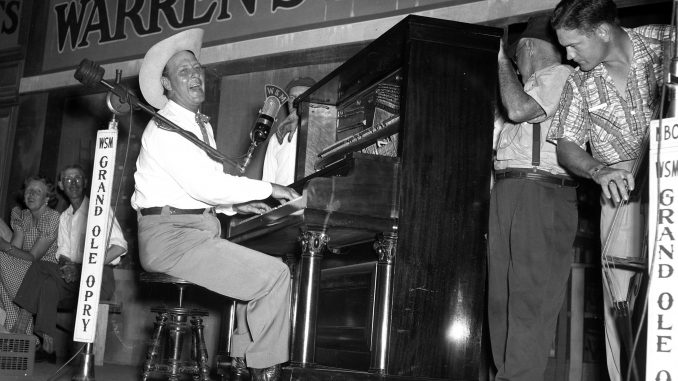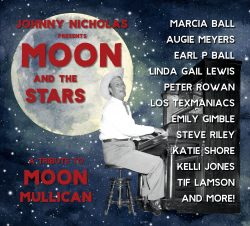
Musicians pay tribute to the King of the Hillbilly Piano Players.
Louisiana Swamp Blues queen, Marcia Ball, said of Moon Mullican “Moon Mullican was the link between the down-home Louisiana music I grew up with and the Western Swing I came to love in Texas. Moon erased that borderline and made it one big Gulf Coast party sound.”
Whilst not a Cajun musician as such, Moon Mullican hailed from East Texas, which cosies right up against Louisiana’s Cajun country, and his band, The Showboys, drawn from both sides of the Texas/Louisiana border, played an exciting mix of country, western swing and cajun, all driven by Mullican’s wild piano playing and song delivery. He referred to it as “East Texas Sock” and Mullican’s own view of his music was, “We gotta play music that’ll make them goddamn beer bottles bounce on the table”.
Moon Mullican is a hugely important figure in the development of what we now call Americana, and especially the Americana that takes in the influence of East Texas and West Louisiana, but his legacy is rarely talked about and his influence rarely acknowledged. That could be about to change, with those fine people at Joel Savoy’s Valcour Records planning a tribute album to the great man, scheduled for release early in 2023.
The only recently departed Jerry Lee Lewis always cited Mullican as a major influence and one little-known fact is that he was co-writer of Hank Williams’ ‘Jambalaya (on the Bayou)’, one of Williams’ best known songs and widely recorded by other artists, though Mullican’s name never appeared on the writing credits, due to legalities and his contract with King Records. He did record his own version of the song, released the same month as Williams’ version, in 1952. While Hank Williams had the big hit, Mullican’s version did little outside his home state. Rumour has it that Williams made regular cash payments to Mullican in recognition of his contributions to the iconic song. In fact, Mullican was an active songwriter, penning hits for himself and others, and he was responsible for a number of well-known country songs, including ‘I’ll Sail My Ship Alone’, ‘Cherokee Boogie’ and ‘Pipeliner Blues’. It’s said that Mullican could’ve been far more financially successful than he was if he’d been as enthusiastic about promoting himself as he was about fishing; and this was a man who achieved nine Top 10 country singles in the course of his career (one of which being his 1947 take on the Cajun classic, ‘Jole Blon’).
 There are many who consider him one of the early influencers for Rock ‘n’ Roll and you can clearly hear Jerry Lee Lewis’ piano style in ‘Cherokee Boogie’ and you can hear what he called his “push beat” in many of Chuck Berry’s early compositions. Mullican became known as “The King of the Hillbilly Piano Players” and it’s sad to think that his importance isn’t more widely acknowledged today.
There are many who consider him one of the early influencers for Rock ‘n’ Roll and you can clearly hear Jerry Lee Lewis’ piano style in ‘Cherokee Boogie’ and you can hear what he called his “push beat” in many of Chuck Berry’s early compositions. Mullican became known as “The King of the Hillbilly Piano Players” and it’s sad to think that his importance isn’t more widely acknowledged today.
That looks set to change with this new tribute recording, “Moon and the Stars”. Curated by Asleep at the Wheel’s Johnny Nicholas, who also co-produced the recording sessions. In addition to Johnny Nicholson himself, some of the Gulf Coast region’s finest roots musicians turned out to record their takes on Mullican’s best-known songs; people like Peter Rowan, Floyd Domino, Steve Riley, Marcia Ball, and a host of others. Nicholas has said of his involvement with the project, “The scope of Moon’s artistry is impressive and the breadth of his repertoire is remarkable. If you dig what we put down on these albums please help us spread the word about this American music icon.”
Moon Mullican was posthumously inducted into the Nashville Songwriters Hall of Fame in 1976, nine years after his death, at the age of 59, while playing a New Year’s Eve gig in Texas – his timing impeccable to the end. A re-evaluation of Mullican’s importance to American roots music is long overdue and this is an album release to look forward to.



Both Moon Mullican and this tribute album are excellent and a tribute album like this is much needed. For those of us in the know who collect, sing and indeed record covers of his songs, we know that Moon Mullican was a special talent and also one of the most influential artists of all time. Starting out as a blues and jazz singer, Moon chose the piano rather than the guitar to back himself. His early repertoire comprised of such blues and bluesy jazz songs as “Pipeliner blues”, “Sundown blues”, “Lay me down beside my darling” and “Dixieland, I hear you calling me”. The latter echoed the popular Al Jolson style of the times while others like “My island reverie” could have fit right into an Inkspots session. Very soon, Moon found himself discovering a new genre out of invention. Like Charlie Rich later, Moon created his version of country music via blues and jazz. In the 1930s and 1940s, he was doing what Merle Haggard etc would be doing some 30-40 years later. Tough bluesy ballads like “Worries on my mind”, “Oh! she’s gone but not forgotten” and the hit “I’ll sail my ship alone” were laying down a form of country music that was raw and innovative. Songs like “The leaves mustn’t fall” and “A crushed red rose” echoed real life and came back to life when Moon’s singing here about a pandemic became real during Covid 19.
Sadly, Moon had not gotten the credit he deserves. You can be assured that Merle Haggard and all those grew up soaking up Moon’s influence but were slow to acknowledge and list him as the inspiration. When you hear Haggard do “Brain cloudy blues” backed by a blues/jazz band including piano, what you are hearing is a version of Moon Mullican. Furthermore, when you are listening to “Lonesome fugitive”, you are hearing a song very like Moon’s “Broken hearted” in both melody and lyrics (only with Moon’s wanderer fleeing a pandemic and loss of his wife replaced by a man outrunning the law and avoiding prison). Haggard pragmatically listed other influences but held back on listing Mullican because most of what Haggard was doing was just updated Moon Mullican. It was convenient not to admit that for marketing reasons!! Haggard rarely covered Moon directly but did spend a career performing other people’s songs in Moon’s style inclusive of an early 2000s album.
Today’s country music has moved away from the blues orientation of Moon’s era and this has created a renewed interest in rediscovering the older singers. This Moon tribute album released last year is most welcome and is essential in keeping his name alive. When I recorded albums, I too always covered Moon Mullican and I have found that Moon’s songs speak to people and offer comfort to people everywhere. His pandemic-themed songs for instance (“1001 sleepless nights”, “Sweeter than the flowers” and “Where beautiful flowers grow” being more) could have been written about Covid but of course were written about TB and other such long gone pandemics.
Finally, I will conclude that anyone who has not done so yet should check out Moon’s music. And not just fans of country either. As said already, he also was blues and jazz (and western swing, the genre of music that combined blues, jazz and traditional ballads). He also was an early exponent of what would go on to be called rock ‘n’ roll. Elvis Presley was telling us exactly in his 1968 Comeback Special TV show that rock ‘n’ roll was around for a lot longer than many released. Elvis knew this and was inspired by this and had heard artists like Moon Mullican. Like Elvis, Moon was a fan of and prolific promoter of African American blues/R&B songs. Some examples of these include covers of Roy Brown’s “Grandpa stole my baby”, Leroy Carr’s “Mean mistreater blues”, Georgia South’s “Falling rain blues” and Bubber Johnson’s “Keep a light in the window for me”. You can see in Moon’s music all the ingredients – the blues and the country, the African American and the European American inspirations, the old and the new – that would soon become rock ‘n’ roll. As with contemporaries like Bill Monroe and Elmore James, Moon didn’t realise at the time he was initiating a music revolution – but we all know he and all of them were.